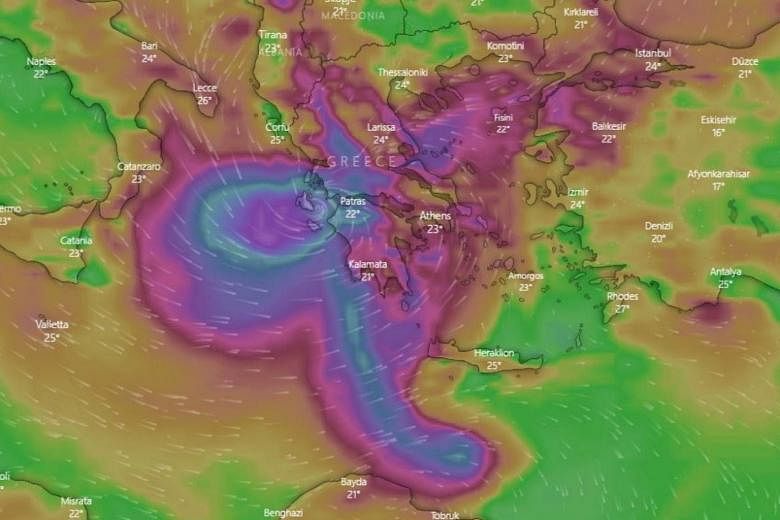ATHENS (NYTIMES, AFP) - At least two flights were rerouted in Greece early on Friday (Sept 18) as the country braced for a hurricane-like storm lashing the Ionian Sea.
Two Ryanair flights to the Ionian island of Cephalonia were unable to land at the local airport and were rerouted to Athens.
This comes as a rare Mediterranean cyclone, which began to rake western Greece with heavy rains on Thursday, was expected to slam into the country in full force on Friday, with hurricane-force wind and life-threatening flooding in some places, forecasters said.
Cyclone Ianos is an example of what meteorologists sometimes call a Medicane - a powerful type of storm all but unknown until the 1990s. It has been seen more often as the atmosphere and sea warm.
Greece's National Meteorological Service issued an unusual bulletin warning of extraordinary danger for southern portions of the country's mainland - a region known for its mild weather - beginning on Thursday afternoon and continuing into Saturday. Forecasters warned that a foot or more of rain could fall in places.
Because Mediterranean storms do not originate in the tropics, meteorologists do not call them tropical storms or hurricanes. But Ianos qualifies in all but name, with cyclonic high winds and satellite images showing the characteristic dense wheel of cloud and a well-defined eye.
By late Thursday, as it crossed the Ionian Sea, it packed tropical storm-force winds. Greek civil protection agency said on Friday the winds were at over 100kmh.
Local residents have reported power outages, damage to roofs and falling trees.
A sailing boat moored off the island of Ithaki was carried away by waves but its two passengers managed to make it to shore, state news agency ANA said.
The civil protection agency has urged those in the storm's path to refrain from non-essential travel and avoid basements.
"We had crews out earlier to clear roads, but we are now pulling them back," the mayor of Cephalonia's capital Argostoli, Dionysis Minetos, told state TV ERT.
"It would be good for residents to stay indoors," he said.
The storm originated as a low pressure system over Libya, moving north and then east over the Mediterranean, brushing southern Italy and gaining power as it drew moisture from waters that have been as warm as 27 deg C in places.
Ianos was expected to pass across the Peloponnese, south of Athens, on Saturday and Sunday, weakening as it crosses land.
Greece has been hit by several weather-related crises in recent years, from flash floods and snowstorms to extreme heat waves and deadly wildfires.

